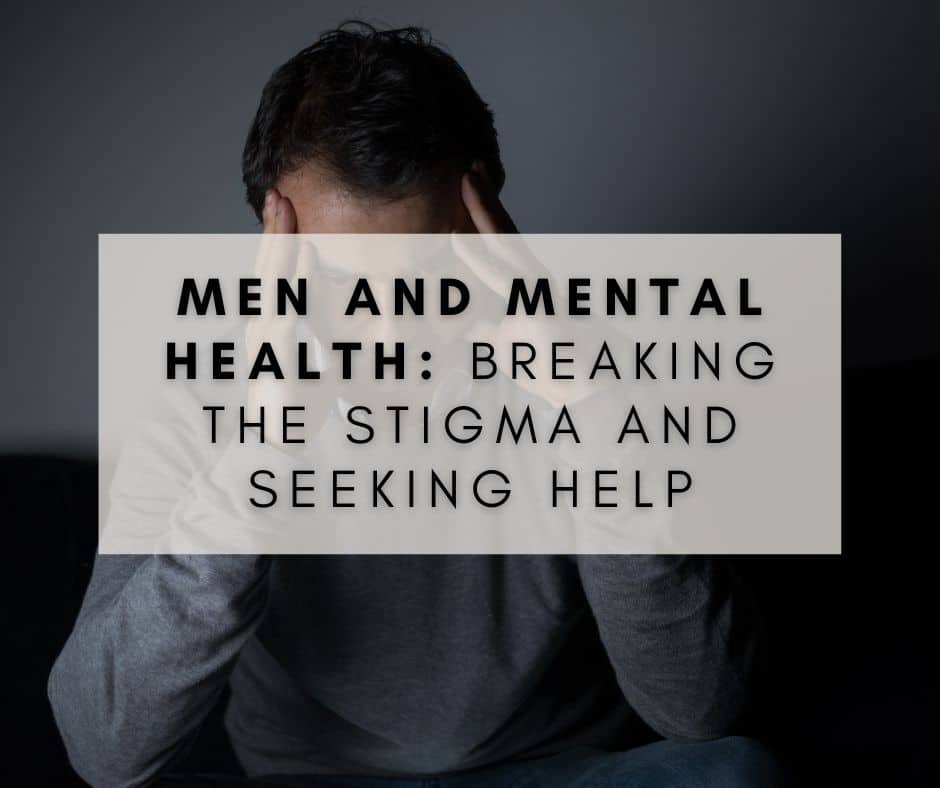In a society that often places expectations on men to be strong, independent, and stoic, the topic of mental health can be surrounded by stigma and silence. However, men must recognize that their mental well-being is just as important as their physical health. In this blog post, we will shed light on the importance of men’s mental health, break down the barriers of stigma, and provide guidance on seeking help when needed. Remember, it takes strength to prioritize your mental health.
Contents
Understanding Men’s Mental Health
Mental health encompasses our emotional, psychological, and social well-being. It affects how we think, feel, and act. While mental health issues can affect anyone, men often face unique challenges and may be less likely to seek help due to societal expectations and gender norms. Consequently, this can lead to undiagnosed or untreated mental health conditions.
Common mental health issues that men may face include depression, anxiety, stress-related disorders, substance abuse, and suicidal thoughts. These challenges can arise from various factors such as work pressures, relationship issues, financial stress, societal expectations, or traumatic experiences.
Breaking the Stigma
Breaking the stigma surrounding men’s mental health is essential to creating a supportive environment where men feel comfortable seeking help. Here are some key steps to dismantle the stigma:
Education and Awareness
Educating ourselves and others about men’s mental health is crucial. By increasing awareness, we can challenge stereotypes, dispel myths, and promote a more compassionate understanding of mental health issues. Recognize that mental health is not a sign of weakness, but a natural aspect of human well-being that requires attention and care.
Open and Honest Conversations
Engaging in open and honest conversations about mental health helps normalize the topic and encourages others to share their experiences. By sharing our own stories or listening non-judgmentally, we can create a safe space for men to express their feelings and concerns. Encourage vulnerability and empathy in your personal and professional relationships.
Role Modeling
Being a positive role model by prioritizing your mental health sends a powerful message. When men openly take care of their well-being, it inspires others to do the same. Lead by example and demonstrate that seeking help is a sign of strength and self-awareness.
Challenging Gender Stereotypes
Questioning and challenging traditional gender norms are essential to combatting the stigma around men’s mental health. Encourage emotional expression, self-compassion, and seeking support as healthy behaviors for men. Emphasize that it’s okay to ask for help and that seeking professional assistance is a responsible choice.
Seeking Help: A Sign of Strength
Seeking help for mental health issues is a courageous and important step towards healing and well-being. Here are some strategies to encourage men to seek the support they need:
Recognize the Signs
Educate yourself about the signs and symptoms of mental health issues. It’s essential to be aware of changes in your thoughts, emotions, and behaviors that may indicate a need for support. These can include persistent sadness, feelings of hopelessness, social withdrawal, irritability, changes in sleep or appetite, substance abuse, or thoughts of self-harm.
Start with Self-Care
Prioritize self-care as a foundation for mental well-being. Engage in activities that promote relaxation, stress reduction, and overall wellness. This can include regular exercise, healthy eating, quality sleep, mindfulness practices, and engaging in hobbies or activities that bring joy.
Reach Out to Loved Ones
Talk to trusted friends, family members, or partners about your concerns. Opening up to someone you trust can provide emotional support and validation. They may offer different perspectives and help you navigate the next steps toward seeking professional help.
Professional Support
Seeking professional help is a crucial step toward addressing mental health challenges. Mental health professionals, such as therapists, counselors, psychologists, or psychiatrists, are trained to provide guidance, support, and evidence-based treatments. They can help you develop coping strategies, navigate difficult emotions, and provide a safe space for healing.
Helpline Resources
In times of crisis, it’s important to know that help is available. If you or someone you know is in immediate danger or experiencing a mental health emergency, please reach out to the emergency hotline for mental health in your country. In the United States, the National Suicide Prevention Lifeline can be reached at 1-800-273-TALK (1-800-273-8255). The lifeline provides free, confidential support 24/7.
Creating Supportive Environments
Supportive environments play a crucial role in men’s mental health. Here’s how we can create and foster these environments:
Workplace Support
Employers can prioritize mental health by promoting work-life balance, providing resources and support, and destigmatizing mental health conversations. Encourage open dialogue, offer mental health days, and provide access to employee assistance programs or mental health resources.
Community and Social Networks
Creating communities and networks that prioritize mental health is crucial. Encourage community organizations, sports clubs, and social groups to actively address mental health and create safe spaces for men to connect, share, and seek support.
Mental Health Education
Integrate mental health education into school curriculums and community programs. Foster an understanding of mental health from an early age, promoting empathy, self-care, and open conversations. By normalizing mental health discussions, we can support the well-being of future generations.
Continued Advocacy
Advocate for policies and initiatives that prioritize men’s mental health. Support organizations working to destigmatize mental health and improve access to mental health services. By joining forces, we can create systemic change and ensure that mental health support is available to all.
Conclusion
Prioritizing men’s mental health and breaking the stigma surrounding it is an important step toward creating a healthier, more compassionate society. By fostering open conversations, educating ourselves and others, and seeking help when needed, men can overcome barriers and find the support they deserve. Remember, seeking help is not a sign of weakness—it’s an act of strength and self-care. Let’s stand together, break the silence, and build a future where men’s mental health is valued, understood, and supported.
Frequently Asked Questions (FAQ)
Q: How do I know if I need professional help for my mental health?
Recognizing when you need professional help can be challenging. However, certain signs can indicate the need for support. If you experience persistent feelings of sadness, anxiety, or hopelessness, have difficulty functioning in daily life, engage in harmful behaviors, or have thoughts of self-harm, it’s important to seek professional help. A mental health professional can assess your situation and provide appropriate guidance and treatment.
Q: How can I find a mental health professional?
Finding a mental health professional starts with identifying the type of support you need. Therapists, psychologists, psychiatrists, and counselors offer different forms of therapy and treatment. You can start by reaching out to your primary care physician for recommendations or searching online directories of mental health professionals in your area. Additionally, mental health hotlines and helplines can provide referrals and guidance.
Q: What if I can’t afford therapy or mental health services?
Cost should not be a barrier to seeking help. Many mental health professionals offer sliding-scale fees based on income, and community mental health centers may provide affordable or free services. Additionally, some employers offer employee assistance programs that include mental health resources. Non-profit organizations and support groups can also offer low-cost or no-cost options. Don’t hesitate to inquire about financial assistance or explore available resources in your community.
Q: How can I support a male friend or family member who may be struggling with mental health?
Supporting someone you care about starts with open and non-judgmental communication. Let them know that you’re there for them and ready to listen without trying to fix their problems. Encourage them to seek professional help and offer assistance in finding resources. Respect their boundaries and don’t pressure them to share more than they are comfortable with. Remember that your role is to provide support, not to act as a mental health professional.
Q: What are some self-care practices that can benefit men’s mental health?
Self-care plays a vital role in mental health. Engaging in activities that promote relaxation, stress reduction, and overall well-being can have a positive impact. Some examples of self-care practices include regular exercise, mindfulness or meditation, spending time in nature, pursuing hobbies or creative outlets, maintaining healthy relationships, getting enough sleep, and seeking social support. It’s important to find what works best for you and prioritize self-care as part of your daily routine.
Q: How can I contribute to reducing the stigma around men’s mental health?
Reducing stigma requires collective effort. Start by educating yourself about mental health and challenging stereotypes. Engage in open conversations about mental health with friends, family, and colleagues, sharing your experiences and encouraging others to do the same. Support mental health organizations and initiatives that work to destigmatize mental health. Remember, every act of compassion and understanding contributes to breaking down the barriers of stigma.
If you or someone you know is in immediate danger or experiencing a mental health emergency, please reach out to the emergency hotline for mental health in your country.
Amazon and the Amazon logo are trademarks of Amazon.com, Inc, or its affiliates.






Leave a Reply